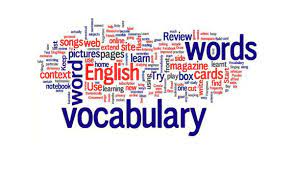Vocabulary
Reading vocabulary
person's reading vocabulary is all the words recognized when reading. This class of vocabulary is generally the most ample, as new words are more commonly encountered when reading than when listening.
Listening vocabulary
A person's listening vocabulary comprises the words recognized when listening to speech. Cues such as the speaker's tone and gestures, the topic of discussion, and the conversation's social context may convey the meaning of an unfamiliar word.
Speaking vocabulary
A person's speaking vocabulary comprises the words used in speech and is generally a subset of the listening vocabulary. Due to the spontaneous nature of speech, words are often misused slightly and unintentionally, but facial expressions and tone of voice can compensate for this misuse.
Writing vocabulary
The written word appears in registers as different as formal essays and social media feeds. While many written words rarely appear in speech, a person's written vocabulary is generally limited by preference and context: a writer may prefer one synonym over another, and they will be unlikely to use technical vocabulary relating to a subject in which they have no interest or knowledge.
Final vocabulary
The American philosopher Richard Rorty characterized a person's "final vocabulary" as follows:
All human beings carry about a set of words which they employ to justify their actions, their beliefs, and their lives. These are the words in which we formulate praise of our friends and contempt for our enemies, our long-term projects, our deepest self-doubts and our highest hopes… I shall call these words a person's "final vocabulary". Those words are as far as he can go with language; beyond them is only helpless passivity or a resort to force. (Contingency, Irony, and Solidarity.
